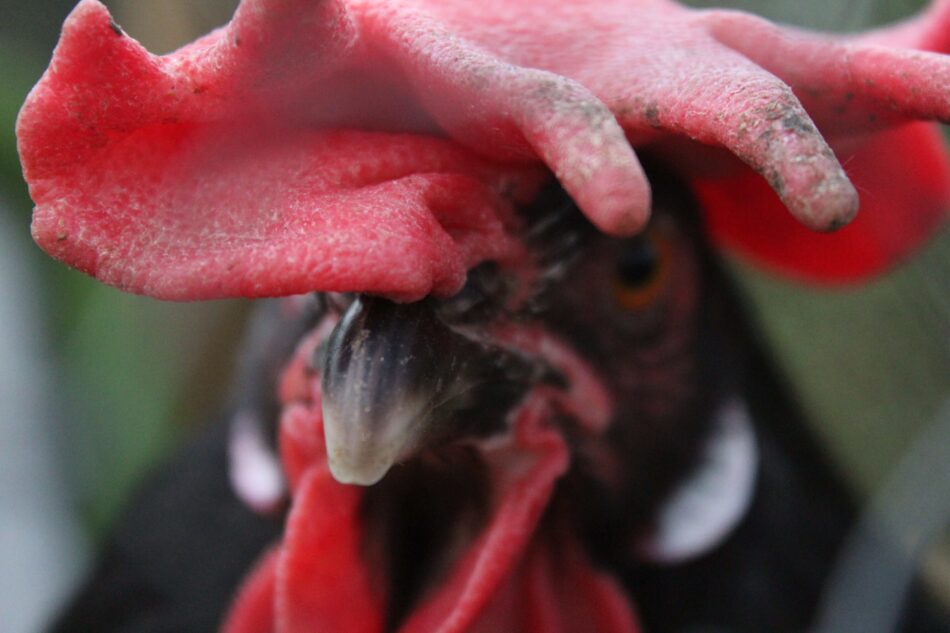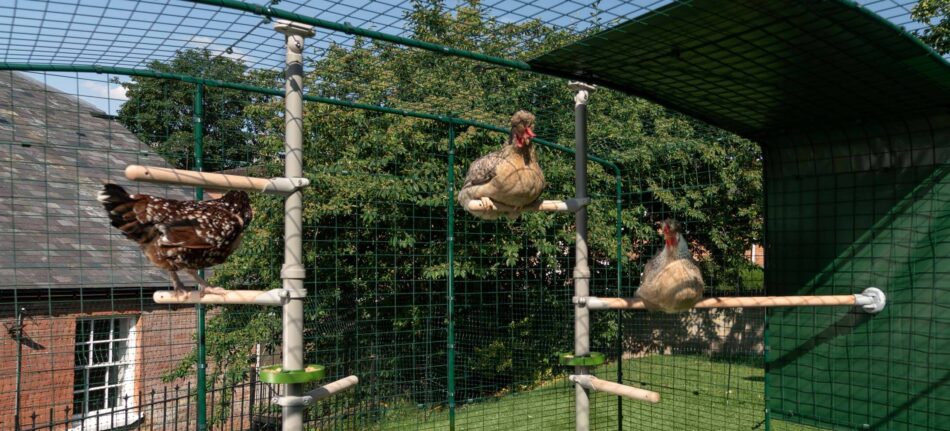Avian Flu Symptoms in Chickens

Avian flu, also known as H5N1 HPAI, has spread to over 40 states over the course of 2022. Beginning in November 2022, the US began seeing record numbers for H5N1 cases among poultry. With bird flu making so many headlines, chicken keepers want to know what they can do to protect their flocks, and what signs and symptoms of avian flu to watch out for.
Symptoms of avian flu in chickens can mimic various other illnesses, so it’s important to familiarize yourself with the most common signs of avian influenza in your flock-members. If you haven’t already, it’s more important than ever to be established with a veterinarian that treats chickens. Only a veterinarian with diagnostic tools can differentiate bird flu from other diseases in chickens.
Along with veterinary care, your chickens need a large chicken coop with a covered run. You’ll want to keep your chickens in an enclosed area that can be optimized for their health. Keeping your chickens close to home will also help you monitor for the signs and symptoms of avian flu.
What is avian flu?
Before becoming acquainted with the signs and symptoms of avian flu, it’s important to understand what type of virus it is. Avian flu, or avian influenza, has a long history in the US– dating back to the early 1900s. Later, the disease formerly known as “fowl plague” would be isolated as an influenza virus.
As with all viruses, avian influenza has many different strains. Virologists identify and label different types of influenza viruses with a letter and number sequence, and in the case of avian influenza, a suffix denoting whether it is low-pathogenic or highly pathogenic. The strain currently in circulation around the globe is H5N1 (the specific strain) HPAI (highly pathogenic avian influenza). This particular variant of avian influenza was first seen in China during the late 1990s. Thankfully, H5N1 HPAI prefers birds for a host, so while human cases of this virus have been documented, it’s very rare. Furthermore, there have been no known cases of human-human transmission of avian influenza.
Unfortunately for chickens, H5N1 HPAI is particularly aggressive in poultry. The hosts carrying the virus (wild aquatic birds such as gulls, ducks, and geese) exhibit little to no symptoms, but are able to spread the virus through their nasal secretions, saliva, and feces. And, since the vectors for avian flu are migratory birds, avian influenza has been spread all over the world throughout the course of the year.
This is why covered chicken runs are one of the best defenses against avian influenza, as the birds carrying the disease are shedding the virus as they fly over. It’s also important to have your hens’ food in covered chicken feeders to not draw attention from birds passing through, and to reduce the amount of falling debris that could contaminate their meals.
Signs and symptoms of avian flu in chickens
Avian flu can present with the same symptoms as many other chicken diseases, so it’s important to know what specific signs to look for. LPAI (low pathogenic avian influenza) viruses can show similar symptoms to HPAI viruses, but are usually much less lethal to poultry in particular. While H5N1 HPAI is the main strain circulating in the US currently, it is possible that other strains of avian flu could infect a backyard chicken flock.
Common LPAI symptoms include:
- Sinusitis (nasal inflammation and congestion)
- Coughing
- Sneezing
- Discharge from the nose or eyes
- Deformed or difficulty laying eggs
Chickens can survive LPAI viruses with supportive care. HPAI virus symptoms can manifest as any of the LPAI symptoms, usually accompanied by:
- Discoloration or swelling in the face, legs, and feet
- Discolored wattles or combs
- Blood-tinged discharge from the nose or eyes
- Greenish diarrhea
Most often, H5N1 HPAI causes sudden and severe disease in chickens, and sudden death may be the first and only sign of illness. Chickens that survive initial infection often exhibit central nervous system symptoms such as incoordination or partial paralysis.
What to do if you think your chickens have avian flu
If you suspect your flock has contracted avian influenza, contact your veterinarian right away. Make note of symptoms, when they started, and how many chickens are affected. Depending on the information provided, your veterinarian may ask you to contact your state’s animal health official, or may contact them directly to discuss next steps.
PPE (personal protective equipment) should be part of every chicken-keepers first-aid kit, and should be worn when handling any ill chickens. Gloves and masks protect you from potential infection, but also helps limit the spread among your other chickens.
If possible, isolate sick chickens far away from your main coop and run. Keep a container of bleach outside of the quarantine run and clean the bottoms of your shoes as soon as you finish caring for ill chickens. Dispose of used gloves and masks promptly, and wash your hands with soap and water. Remove and wash all clothing that comes into contact with sick chickens as soon as possible.
Prognosis of avian flu in chickens
Unfortunately, H5N1 HPAI carries nearly a 100% mortality rate for chickens. This particular variant has even been causing symptomatic illness and death in wild birds that act as its host. Supportive therapy is the only treatment for avian influenza, but shows little success since H5N1 causes such severe and rapid illness.
There is not currently an approved vaccine in the US for H5N1 HPAI in chickens, but trials are underway to produce an effective and practical vaccine. Antiviral treatment is not currently recommended. With so little options, prevention remains the best treatment for avian flu.
How to prevent avian flu in chickens
The USDA recommends these methods for preventing avian flu in chickens:
- Restrict access to your property and your flock to both humans and animals
- Clean and regularly disinfect anything that comes into contact with your chickens
- If visiting another site with birds of any kind, thoroughly clean and disinfect any equipment that was used before bringing it home
- Don’t borrow lawn and garden equipment, poultry supplies, or other outdoor tools from other bird-keepers
- Know the warning signs and symptoms of avian flu
- Report chicken illness to your local veterinarian, or to your state’s animal health official
Create a barrier around the perimeter of your chicken run and coop with chicken fencing to prevent visits by curious animals – or humans! Make sure to have a well ventilated, easy to clean chicken coop attached to a walk in chicken run that is fully covered across the top. This will not only give your chickens a safe space to enjoy their time, but will also give you ease of access to clean and care for your hens.
What products to use against avian flu
An easy to clean chicken coop, walk in chicken run, and chicken run covers are necessities for keeping your chickens protected from avian flu, but there are number of other products that make caring for chickens during an avian flu outbreak easier and more enjoyable – both for you, and your flock!
A walk in chicken run porch addition is a perfect space to keep your PPE and cleaning essentials close by when entering and exiting your chickens’ run. Keep a box of disposable gloves, some masks, a spray bottle of disinfectant for the bottoms of your shoes, hand sanitizer, and trash bags in a bucket inside of the porch addition for easy access.
Chickens that are accustomed to free-ranging can experience boredom when first being “cooped up.” Offer chicken toys to encourage foraging and other natural activities to help pass the time. A freestanding chicken perch is a favorite among flocks, or design your own perching spaces with a chicken perch tree. The more (covered) space and activities you can give your hens, the healthier and happier they will be!
How Omlet can help
Our designs for chicken products have always had the wellbeing of both pets and their people in mind. The global spread of avian influenza didn’t change our vision or designs, but it did illuminate how an “ounce of prevention is worth a pound of cure” in the current climate for chickens. Omlet customers have had to make very few changes for their chickens in light of current events because our products were invented to withstand the elements and circumstances that chicken-keepers find themselves in. By providing your chickens with the best products year-round, you’ll be ready for whatever the years bring!
See how a chicken setup from Omlet can bring you and your chickens peace of mind in any season. Avian flu doesn’t show partiality to commercial poultry farms or backyard flocks of chickens, but by staying informed, prepared, and educated, you can continue to foster the bond between you and your chickens without the fear of avian flu.
This entry was posted in Chickens
